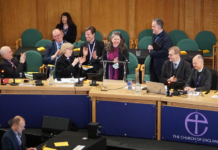Today’s Presidential Address is set within the context of a Eucharist and so it felt more appropriate that it should have a rather more homiletical feel to it. That, for me, involves closer attention to the Scripture passages which today are those set for St. Margaret, 11th century Queen consort to King Malcolm of Scotland, known also as a scholar and intellectual, a deeply religious woman and a philanthropist. There are many accounts of Margaret’s care for the poor and marginalised, prisoners, beggars, lepers and orphans and she encouraged and supported the founding of schools, hospitals and orphanages.
Margaret also sought to bring the Scottish Church more in line with the wider church community throughout Europe, recognising the importance of belonging to something bigger; being part of a church family that could provide the undergirding to support the distinctiveness of local differences. And Margaret also attempted to reconcile feuds between various highland clans though in this she was less successful and, for that, she has my profound admiration and sympathy. Reconciliation, it seems, has always been challenging. As it was then, so it is now.
And that brings us, fairly neatly, to today’s Gospel reading in which we encounter Jesus’ disciples, this time the brothers James and John, getting it wrong once again. It’s always reassuring to see the closest followers of Jesus in their full humanity – those who had Jesus with them every day, missing the point, demonstrating human frailty, failing to understand the ways of Christ, bumbling around in their quest for greater discovery and understanding.
In the verses immediately preceding today’s passage (vv33-34 to be precise), Jesus has predicted his passion for the third time. And in response to this extraordinary revelation, James and John rather miss the point and begin bickering about which one would have the place of glory at Jesus’ right hand. Perhaps we shouldn’t be surprised. In moments of shock or embarrassment, when we don’t know what to say, it’s all too easy to blurt out something that comes out all wrong.
But let’s look a little deeper and let me, if I may, share a few thoughts with you.
In this clumsy cackhandedness, I notice what I can only describe as a very human connection between fear and confusion on one hand, and the need for security and certainty on the other. The life shattering news about Jesus’ imminent and violent death must have shaken the foundations of their world and so it’s hardly surprising that James and John were looking for reassurance that all would be well for them. Frightened and disorientated by Jesus’ revelation, they need to know that whatever happens, they will be OK, they will end up sitting at his right hand in glory.
And Synod, might it just be that their fears mirror our fears (particularly following the events of this past week); might it be that our desire for security and certainty mirrors their desire for security and certainty.
So, how does Jesus react? Well, as so often, he doesn’t give a clear answer, at least not straight away. Rather, he changes the terms of the conversation and broadens the perspective by, somewhat unexpectedly, alluding to the themes of baptism and holy communion. “Are you able to drink the cup that I drink, or be baptised with the baptism that I am baptised?” he asks them. Baptism and the Eucharist – the two central practices of the Christian community and today, as then, they interrupt and challenge our quest for security, certainty, safety and instead they point towards another alternative way which is one of servanthood and sacrifice.
Being baptised and sharing the cup are not just nice things we do as Christians, rather they invite us, propel us even, into the way of the crucified Christ, not to look for our own personal certainties and assurances but to trust in the one who takes us to the foot of the cross, and to resurrection and new life beyond, where it is for God alone to make judgements about who sits where in glory.
We face many fears and uncertainties in our world today, and also within the life of our church. Right now we are emerging from the recent election results in the United States which confirm deep divisions in one of the greatest nations in the world. Many of those divisions are echoed in this country and around the globe, combining with the environmental crisis and the devastating wars that fuel further conflict, division, fear and hate. And in the Church, the cry of victims and survivors of abuse once again pierces our complacency; confidence in the senior leadership of the church has been badly damaged, questions are rightly being asked about whether the church really is able to put the needs of victims above personal friendships or the interests of the institution; and we are coming to terms with the unprecedented resignation of an archbishop. And let’s be clear that there is probably more yet to come before the dust even begins to settle on the appalling story which the Makin review has exposed. It’s no wonder there’s fear and anxiety in the air. The question is, what will we do? Will we grasp clumsily for confirmation of our own certainties, or will we, with Christ, remind ourselves of our baptism, share in the drinking of the cup, and work together, in all humility, to bring healing and harmony?
Dear brothers and sisters, dear friends, I hear the cries for assurance and certainty – these are human and very understandable. We must recommit ourselves to building a safer church, redoubling our efforts to ensure that safeguarding is at the heart of all we do. And as we do so, we don’t have the luxury of allowing our internal debates and arguments to continue spreading anxiety and discord, tearing the body of Christ limb from limb. Around matters relating to LLF, let me say once again, as I have said on many occasions, I know there are those who are impatient for greater change and progress. I know, too, there are those who are deeply troubled by the changes they perceive. And many, on all sides of this ongoing debate, in which it often feels like we have so little control, are looking for certainty. So let us all take care not to put our hope in the kind of certainty that confirms one position; one reading of Scripture; one particular emphasis within the life of faith; the kind of certainty which, we might say, is looking to secure a place at Jesus’ right hand.
I give you my word that I will continue to listen and have conversations. With my colleagues on the Bishop’s Leadership Team, we will continue to discern how best to navigate these testy waters within the context of Chelmsford Diocese and to demonstrate as best we can our longing for everyone to know they have a valued place in our shared life. But if we are to do so well, if we are to model a different way of living with deep divisions, whilst striving towards the unity that Christ calls us to, then we must not give in to the fears and anxieties that drive us towards the assurance’s we crave, whatever our perspective.
Instead, we must cultivate greater humility in our shared life, we must be patient and loving towards one another, not casting judgement but assuming and wanting the best for each other, sitting light to our certainties, holding them with a certain provisionality as brothers and sisters in Christ, who alone decides where we will each find our place in God’s kingdom of glory. The simple truth is that, whether we like it or not, we need each other and we must attend to God’s call for unity in our diversity. Each one of us, on our own, in our tribes, has limited and narrow vision, together we get a much broader perspective of what it is to be part of the body of Christ. That is why I do so much consulting with Bishop’s Leadership Colleagues and others more widely, before making decisions about the life of the Diocese. Regardless of my calling and vocation to be the Bishop of Chelmsford, I can only offer of my best, when I’m in deep, respectful and trusting relationship with others.
So here’s a thought, what would it look like if every church community in this diocese took time to reflect on its own failings and shortcomings, whilst celebrating the blessings they recognise in their neighbouring churches? How might our diocese be transformed if all of us let go of our priorities and looked with gentleness and humility on the priorities of others. Isn’t that what it means to build community? Let me share some words from Henri Nouwen in his book Following Jesus which I’m reading at the moment. This is what he says:
One of the most exciting aspects of the Christian life is that it does not put people in a mold (sic.), but creates a rich variety of people in whom the love of God becomes incarnate in very different ways … a community is precisely a gathering of those who in different ways have integrated and incorporated the call [to follow Jesus].[1]
As I draw to a close, let me return briefly to our Gospel reading. In their affirmative response to Jesus’ question about whether they can drink the cup and be baptised with the baptism of Christ, James and John are issued with a promise: “The cup that I drink you will drink; the baptism with which I’m baptised, you will be baptised”. Sometimes these words are read as a warning or even a threat from Jesus: you too will suffer and be crucified, he seems to be saying. And perhaps there is something of that. But in the context of the whole story maybe, just maybe, we can hear the whisper of another extraordinary promise held out, not just to each of us as individuals but as the body of Christ, the community of the Church. If you drink the cup, Jesus says, if you are baptised with the baptism of Christ, you will not always be driven by your fears or your need for security. Rather, you will be empowered to take up your cross and follow me. You will be faithful disciples to the end.
I pray that may be true for us here in Chelmsford Diocese, now and always.
+Guli Chelmsford
[1] Henri Nouwen, Following Jesus. London: SPCK, 2019, p 48.


